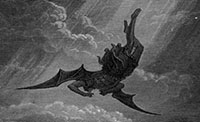Belial: Difference between revisions
(Removed redirect to Sons of Belial) Tag: Removed redirect |
PeterDuffy (talk | contribs) No edit summary |
||
| Line 1: | Line 1: | ||
<languages /> | |||
<translate> | |||
{{False hierarchy/en}} | {{False hierarchy/en}} | ||
| Line 18: | Line 20: | ||
{{LTF}} | {{LTF}} | ||
</translate> | |||
Revision as of 05:43, 9 July 2024

False Hierarchy
“Belial,” taken from the Hebrew bĕlīya’al, meaning “worthlessness,” is a term used interchangeably with Satan. Actually, it is the name of another fallen angel whose sons took embodiment after the fall of Lucifer.
In the Old Testament, belial is usually interpreted as a common noun meaning worthlessness, ungodliness, or wickedness. (Deut. 13:13; Judges 19:22; 20:13; I Samuel 2:12; 10:27; 25:17; II Samuel 23:6; I Kings 21:10, 13; II Chronicles 13:7). In II Cor. 6:15, Belial is used as a proper name for a prince of demons.
Belial is described in Milton’s Paradise Lost as one of the fallen angels.
See also
Sources
Pearls of Wisdom, vol. 14, no. 5, January 31, 1971.
Mark L. Prophet and Elizabeth Clare Prophet, Lost Teachings on Finding God Within
